World Poetry Movement Coordinators Plan to Establish Poetry Schools Worldwide
The World Poetry Movement (WPM) Continental Coordinators convened virtually to discuss an ambitious initiative—establishing poetry schools across the globe. The meeting, held on February 16, 2025, brought together key literary figures and cultural leaders to outline strategies for promoting poetry education and fostering creative expression in diverse communities.
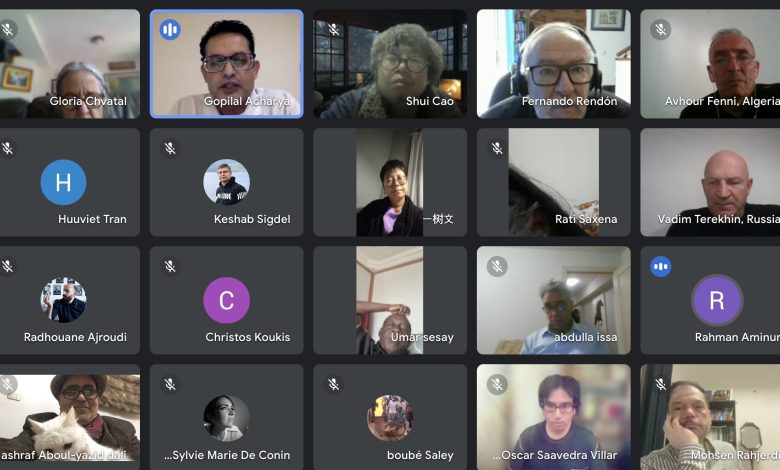
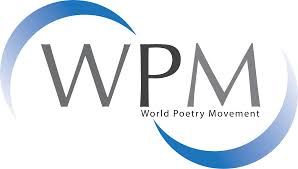
The World Poetry Movement (WPM) Continental Coordinators convened virtually to discuss an ambitious initiative—establishing poetry schools across the globe. The meeting, held on February 16, 2025, brought together key literary figures and cultural leaders to outline strategies for promoting poetry education and fostering creative expression in diverse communities.
The meeting was convened to consider the moment the world is living in today and the WPM’s duty. It is clear that WPM cannot change history, nor poetry can do it, but the spirit of WPM is a manifestation of the will of poets and humanity to reach a new moment of peace, search of social justice, sovereignty and self-determination of the peoples. The desire of the peoples of the world to move towards independence and the resolution of conflicts through dialogue especially in the case of Ukraine, put an end to imperialist and Zionist expansion.
A statement on this matter has been released later.It was proposed to draft of WPM statement of the current moment, included Palestine invasion, serious economic blockage to Cuba, Venezuela, and the total repudiation of Trump’s colonialist attitude and to accompany the people in their resistance. The working group for drafting the declaration was formed by Cao Shui, Vadim Terekhin, Rati Saxena, Keshab Sigdel, Oumar Farouk Sesay.
The second proposal is that 2025 be the year of the development of the Poetry Schools in the world, deploying pedagogical process in as many countries as possible and thus optimize the conditions for the creation of the World Poetry School of WPM.
Fernando Rendón (Columbia), WPM General Coordinator, previously explained how the project of one World Poetry School has been immersed in the work plans of WPM since its foundation, in 2011, when the Movement was founded by 37 directors of International Poetry Festivals and formative Poetry Projects in a meet in Medellín:
“A first meet of the WPM Coordinating Committee in January 2025, was convened to work on the planification of the World Poetry School project, based on a contribution managed by the International Poetry Festival of Medellin and of WPM’s concrete commitment in the Bolivarian Republic of Venezuela, which allows the development of a first phase of the project, to which all de WPMs members are invited to join and contribute with their experiences and ideas. This could be the first WPM’s great opportunity to structure a collective effort, different to planetary actions, meetings, declarations. It is a moment of collective reflection facing the world, bringing together poets to think from poetic thinking about today’s most serious problems. The structure of the Conference for Palestine shows how the great poets of the world are important thinkers, the world needs the thought of poets on the problems that put life at risk”.
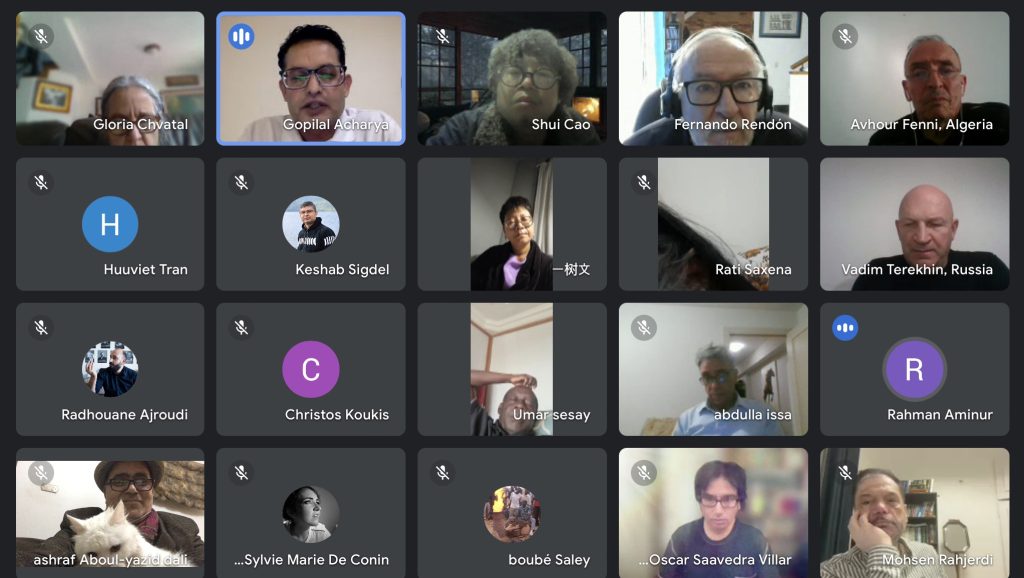
Medellin exposes that there are several experiences of Poetry Schools such as Venezuela, Medellin, Chile, India, Bangladesh, the Gorki School of Moscow, Iran, China, many counties in Africa and others, which have been developed for some years in several cities in each of the countries. Likewise, many of the members of WPM have experience through their participation in universities, workshops, and other activities.
This School is proposed for poets from all over the world who want to approach an international pedagogical process, explore deeper into their work, create ties and communication with colleagues in the world.
Among the notable attendees on Sunday were Fernando Rendón (Colombia), Rati Saxena (India), Vadim Terekhin (Russia), Keshab Sigdel (Nepal), Achour Fenni (Algeria), Zolani Mkiva (South Africa), Oscar Saavedra (Chile), Ashraf Aboul-Yazid Ashraf-Dali (Egypt), Khalid Raissouni (Morocco), Saley Boubé Bali (Niger), Aminur Rahman (Bangladesh), Abdulla Issa (Palestine), Christine Peiying Chen (New Zealand), Cao Shui (China), Huu Viet (Vietnam), Mohsen K. Rahjerdi (Iran), Sylvie Marie (Belgium), Christos Koukis (Greece), Oumar Farouk Sesay (Sierra Leone), Radhouane Ajroudi (Tunisia), Gopilal Acharya (Bhutan), and Gloria Chvatal (Colombia), who has been the golden voice of translation between Spanish and English, while Achour Fenni helped in French, Vadim Terekhin helped in Russian and Ashraf Aboul-Yazid helped in Arabic.
The coordinators emphasized the necessity of accessible poetry education to nurture emerging voices and preserve the rich traditions of global poetic heritage. Discussions revolved around the logistics of establishing poetry schools in various regions, fostering literary networks, and securing support from cultural institutions.
The World Poetry Movement (WPM) remains committed to its mission of uniting poets and literary activists worldwide, ensuring that poetry remains a powerful tool for cultural exchange, social change, and artistic innovation.
Each National Coordination can assess the organizational status of WPM in its country and strengthen its working group in the path of our pedagogical task.
In the process of creating Poetry Schools, the proliferation of workshops is necessary.
Those who have developed National Poetry Schools, such as Venezuela, Colombia, Cuba, Chile, Honduras, can share they curricula to build a common program that will be nourished with the diversity that can contribute with talks and/or videos.
It is clear to everyone that the existence of multiple languages is both a richness of WPM and a challenge that requires that the videos and other material be translated into central languages and later, in each country to their national languages.
The World Poetry School should have a modern online site that focuses all resources for all audiences, naturally it should be attractive and orderly for young people, who may be the primary target audience. Include there: texts, lectures, an online library, with books of the greatest poets in history.
The Coordinating Committee looks forward to receiving reports from all its members on the preparatory work of the School of Poetry.
Radhouane Ajroudi (Tunisia) presents hush experience of forming a legal association to discover and bring together young poets who want to publish, translate, share their works and make criticism.
In Niger, Saley Boubé Bali mentioned that writers have initiated a process to reorganize the entire literary environment with the creation of a national federation. Niger is engaged in a cultural policy process alongside Burkina Faso and Mali. It is likely that poets from the three countries will now participate under the same banner (Confederation of Sahel States) in international events.
China expresses interest in developing a branch of the School. Shui Cao said that “since we are a world poetry school, we should include the major languages of the world, not just our mother tongue. I suggest editing a common textbook that includes a brief history of poetry in all major languages and ten representative poems, initially starting from languages such as Spanish, Chinese, English, Russian, Arabic, French, Hindi, etc., gradually expanding to all poetic languages, and then translating into the corresponding languages and publishing in different countries. This can be used through online and offline teaching.”
According to Ashraf Dali, the notion of a School of Poetry is both an elegant and profoundly humane vision. Yet, to bring this concept to life within the framework of the World Poetry Movement, several essential considerations must be addressed.
First and foremost is content, which must be carefully attuned to the linguistic and cultural fabric of each community. A singular, standardized curriculum cannot encompass the vast diversity of poetic traditions or the subtle nuances of language that shape expression across different regions. Each tongue, each culture, must find its own voice within this initiative.
Equally crucial is the technical platform. Should the School of Poetry manifest through a YouTube channel, a Facebook page, or perhaps Instagram? Each medium offers distinct advantages and challenges, and the chosen platform must align with the preferences of the intended audience, ensuring accessibility and engagement.
Funding, too, is a vital pillar of this endeavor. Securing financial resources is imperative, whether for developing a digital hub or establishing a physical space for in-person gatherings. Without adequate support, the initiative risks remaining a vision rather than a tangible reality.
Dali further proposed practical steps to cultivate and expand the School’s reach. Printing booklets for young readers and producing CDs filled with poetic recitations, lectures, and curated content could serve as powerful tools to introduce both local and international poetry collections to a broader audience. These materials would form part of a comprehensive plan to distribute poetic works across cultures, fostering a deeper appreciation for the art.
Yet, the School of Poetry is not intended solely for the younger generation. On the contrary, it aspires to embrace all ages, ensuring that content is crafted with a universality that speaks to every stage of life. Where appropriate, content creators might adapt and translate materials from other languages, enriching the poetic discourse across linguistic borders.
Given the complexities of legal, financial, and organizational constraints, establishing a physical school may prove challenging. Thus, the journey must begin in the digital realm—an online sanctuary for poetry, where voices from every corner of the world may converge, share, and inspire.
In Vietnam they are working on the WPM tasks from the Writers Association. They will have this year a Congress of the Association to select a new committee.
In Greece, it is reported that they are advancing the publication of the books by Palestinian poets Najwan Darwish and Murad Sudani and they will also hold a book fair for Palestine in October.
In Bangladesh they are working with workshops, updating local knowledge of what is happening in the world. Bangladesh has decided to run a Poetry Workshop with International speakers in Mid March in collaboration with WPM. Promotional Flyers will send soon.
Bhutan does not have a strong literary history; they are trying to establish workshops with young people who want to publish. There are many young people interested and surely a school will be very useful. They are going to move towards participating more strongly in the WPM programs.
During the meeting Aminur Rahman invited WPM to send their poems for the next edition of The Dhaka Review, published in Bangladesh.


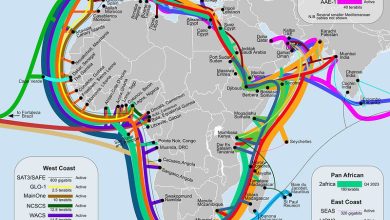
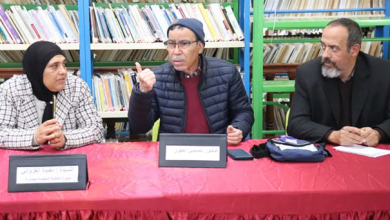

فكرة عظيمة تستحق الإهتمام وأقترح إقامة تواصل مع المراكز الثقافية في كل دولة وذلك لسهولة التواصل وإقامة لقاءات وورش ومؤتمرات والإهتمام بالترجمة كعامل أساسي في هذه المبادرة وإنشاء عدة قنوات معنية بالشعر وطرح مبادئ تلك المدرسة وتبادل الخبرات الثقافية وإبراز السمات والمروثات الثقافية التي تميز كل مجتمع
فالمبادرة طموحة وعاطفية إلى حد ما وذلك في ظل طغيان المادة ولغة القوة وهيمنة العولمة والإستقطاب.. ابهدف إنساني وواجب بالفعل يحتاج لمخلصين مستعدون للتضحية